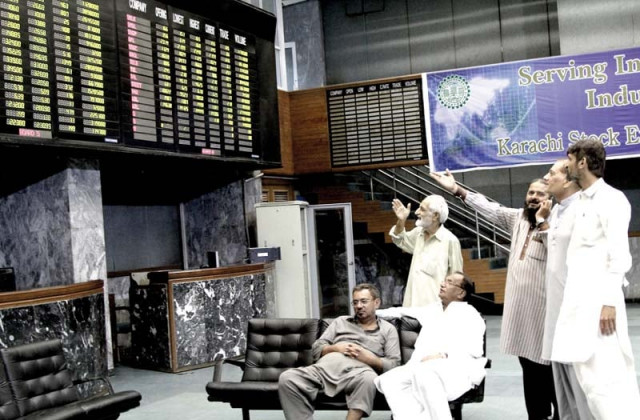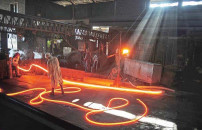Rumours and panic: Index hit, bleeds 1,030 points
Foreign institutional investors were net buyers of Rs611 million on Monday

Foreign institutional investors were net buyers of rs611 million on monday. PHOTO: AYSHA SALEEM
Prices of blue-chip stocks fell sharply across the board on Monday, resulting in a drop of 3.44% in the benchmark index.
In the fifth straight session that saw bearish activity on the bourse, the Karachi Stock Exchange (KSE)-100 Index decreased to 28,927 points, which is down 17% from its peak at the end of January.
The rumour mill was in overdrive throughout the session, as analysts attributed the substantial declines in share prices to massive selling by local institutions as well as high net worth individuals (HNWIs).
“Many HNWIs received margin calls after two weeks of consistent declines in the benchmark index,” said one broker while speaking to The Express Tribune. This was in addition to the selling by local mutual funds that had to meet their clients’ requests for redemptions, the broker added.
According to Summit Capital analyst Farhan Malik, selling by asset management companies running capital-protected funds played a key role in Monday’s decline. “They sell massively when the market is down because of the way their capital preservation funds are structured,” Malik said.
According to Topline Securities analyst Fahad Qasim, as much as Rs1.4 trillion, or $14.2 billion, has evaporated from the index market capitalisation since it reached its highest point roughly two months ago.
Heavy selling was witnessed on Monday in almost all blue-chip stocks, including DG Khan Cement, Engro Corporation, Hascol, Hubco, Maple Leaf Cement, Nishat Chunian and PSO. Their share prices dropped 5%, resulting in a halt in their trading during the session.
The KSE-100 Index has decreased 12.1% since March 13 when foreign funds resorted to huge divestments. Net outflows of foreign portfolio investments between March 13 and March 27 have been $40.5 million.

However, foreign institutional investors were net buyers of Rs611 million on Monday, according to data maintained by the National Clearing Company of Pakistan.
Yemen effect?
Some analysts said the unrest in Yemen also helped dampened foreign investors’ sentiment in recent trading sessions. Many foreign funds classify Pakistan as a member of the Middle East and North Africa (MENA) region. Reports about Pakistan’s possible military involvement in the Yemen crisis are provoking a negative sentiment among foreign investors, they say.
However, other analysts attribute the declines on the bourse to the ongoing tussle between the brokers and regulators. Word on McLeod Road has it that the Securities and Exchange Commission of Pakistan, which is the apex regulator of the equity market, is investigating three large asset management companies for alleged front-running and insider trading.
This follows the reported initiation of inquiries by the KSE, which is the frontline regulator, against 23 brokers for alleged misuse of clients’ assets.
Out of 382 stocks traded on Monday, prices of only 24 stocks increased while those of 350 shares declined. Prices of eight remained unchanged.
Trade volumes increased to 207 million shares, up 37% from the preceding trading session. The value of shares traded remained Rs9.2 billion against the trading of Rs8.4 billion on the last day of the previous week.
K-Electric was the volume leader with 46.1 million shares losing Rs0.65 to finish at Rs6.11 each.
Published in The Express Tribune, March 31st, 2015.
Like Business on Facebook, follow @TribuneBiz on Twitter to stay informed and join in the conversation.



















COMMENTS
Comments are moderated and generally will be posted if they are on-topic and not abusive.
For more information, please see our Comments FAQ